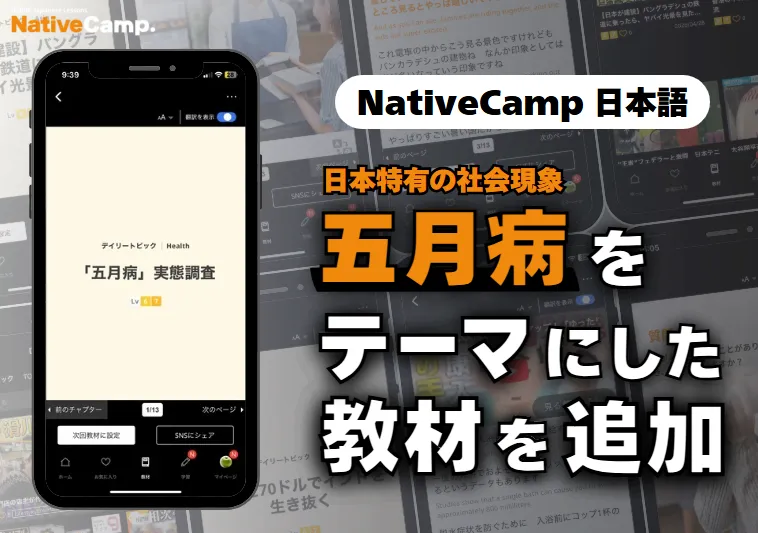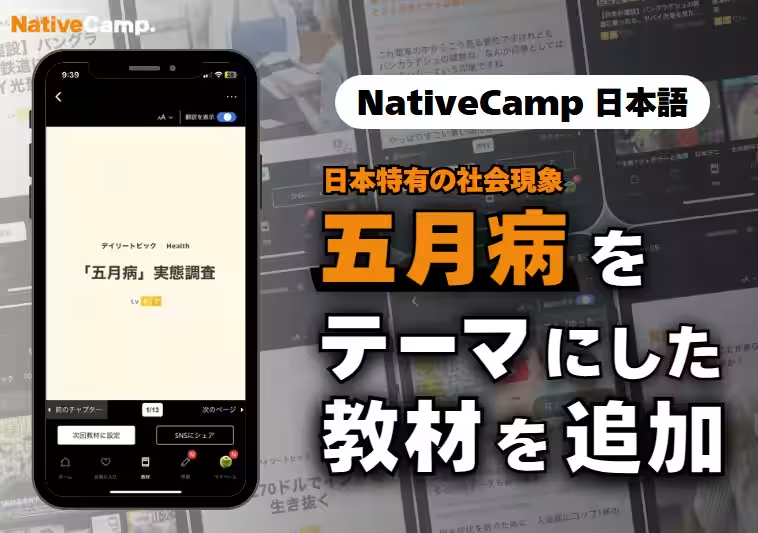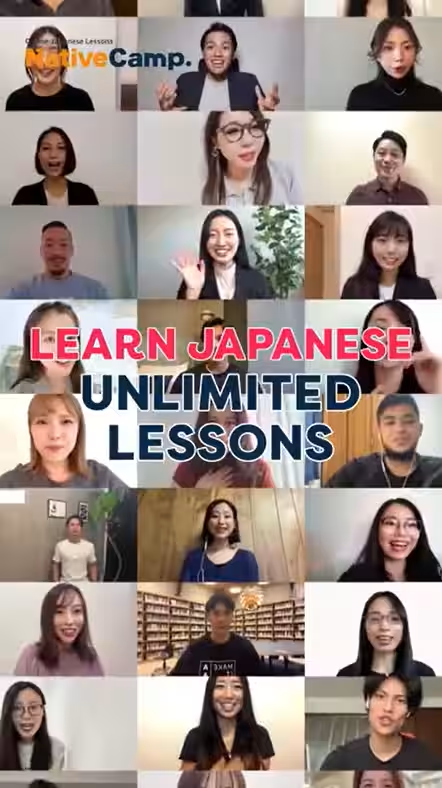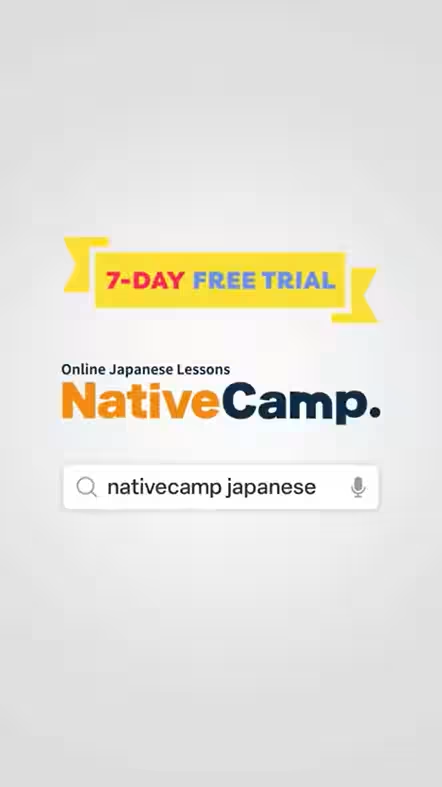

Discovering the Cultural Significance of 'Gogatsu-byo' with Native Camp Japanese Lessons
Daily Topics" series, focusing specifically on the cultural phenomenon known as 'Gogatsu-byo' or May sickness. As many learners dive into the intricacies of the Japanese language, this lesson aims to provide a deeper understanding of a concept that deeply intertwines with Japanese culture and societal norms.
Gogatsu-byo, translating to 'May sickness', refers to the feelings of mental and physical fatigue that often hit many individuals around May, when the new school and work year is well underway. This phenomenon is uniquely Japanese, often linked to the country's hard-working culture and the pressures that come with it. While outsiders may not fully grasp its significance or even the term itself, this new lesson equips learners with the necessary context and understanding.
The latest addition to the Daily Topics curriculum allows users to view a brief video that succinctly explains the concept of Gogatsu-byo. Following this visual aid, learners engage in discussions with their instructors to delve into the values and societal implications associated with this phenomenon. This interactive approach not only enhances language skills but also fosters a richer appreciation of Japanese culture, making it a vital component of one's learning journey.
Native Camp's Daily Topics lessons are not just limited to specific cultural terms; they cover a broad range of subjects, integrating elements such as entertainment, business, and anime into the learning material. Each session consists of a short video, usually about one minute long, which serves as a springboard for engaging discussions.
One of the strengths of Native Camp Japanese is its commitment to providing practical language skills. Through this format, learners encounter real-life Japanese that they can use in everyday conversations. Unlike traditional textbook methods, this approach immerses students in lively, genuine discussions that prepare them for various scenarios they might face in Japan.
This lesson is designed for a wide audience:
To celebrate the launch of this exciting new curriculum addition, Native Camp Japanese is offering a 7-Day Free Trial, providing new users with unlimited access to lessons, including this specific topic. Along with the trial, each new user will also receive USD 20 worth of coins, a fantastic opportunity to explore the platform's extensive offerings without any financial commitment.
The campaign runs from May 1, 2025 to May 31, 2025. It's an initiative aimed at making learning Japanese more accessible and enjoyable for everyone, especially those eager to learn about unique cultural phenomena like Gogatsu-byo. To join, simply click here to sign up for your free trial.
At Native Camp Japanese, the mission remains clear: to provide engaging, relevant learning opportunities that support both language acquisition and cultural understanding. The new lesson on Gogatsu-byo is a testament to this commitment, offering learners a unique path to immerse themselves in the language and culture of Japan. As we continue to develop our materials and services, we invite learners from around the globe to join us on this exciting journey.
For more information about Native Camp Japanese and its expanding course offerings, visit our official website.





What is Gogatsu-byo?
Gogatsu-byo, translating to 'May sickness', refers to the feelings of mental and physical fatigue that often hit many individuals around May, when the new school and work year is well underway. This phenomenon is uniquely Japanese, often linked to the country's hard-working culture and the pressures that come with it. While outsiders may not fully grasp its significance or even the term itself, this new lesson equips learners with the necessary context and understanding.
New Lesson Features
The latest addition to the Daily Topics curriculum allows users to view a brief video that succinctly explains the concept of Gogatsu-byo. Following this visual aid, learners engage in discussions with their instructors to delve into the values and societal implications associated with this phenomenon. This interactive approach not only enhances language skills but also fosters a richer appreciation of Japanese culture, making it a vital component of one's learning journey.
Daily Topics: An Overview
Native Camp's Daily Topics lessons are not just limited to specific cultural terms; they cover a broad range of subjects, integrating elements such as entertainment, business, and anime into the learning material. Each session consists of a short video, usually about one minute long, which serves as a springboard for engaging discussions.
Practical Application
One of the strengths of Native Camp Japanese is its commitment to providing practical language skills. Through this format, learners encounter real-life Japanese that they can use in everyday conversations. Unlike traditional textbook methods, this approach immerses students in lively, genuine discussions that prepare them for various scenarios they might face in Japan.
Who Can Benefit?
This lesson is designed for a wide audience:
- - Individuals who enjoy using visual media, like YouTube or anime, to support their learning.
- - Beginners aiming to acclimatize to essential Japanese phrases and expressions.
- - Advanced learners ready to transition from textbook Japanese to real-world language use.
- - Anime fans who wish to deepen their understanding through familiar content.
- - Learners focused on enhancing their speaking skills via engaging discussions.
Limited-Time Offer
To celebrate the launch of this exciting new curriculum addition, Native Camp Japanese is offering a 7-Day Free Trial, providing new users with unlimited access to lessons, including this specific topic. Along with the trial, each new user will also receive USD 20 worth of coins, a fantastic opportunity to explore the platform's extensive offerings without any financial commitment.
Campaign Details
The campaign runs from May 1, 2025 to May 31, 2025. It's an initiative aimed at making learning Japanese more accessible and enjoyable for everyone, especially those eager to learn about unique cultural phenomena like Gogatsu-byo. To join, simply click here to sign up for your free trial.
Conclusion
At Native Camp Japanese, the mission remains clear: to provide engaging, relevant learning opportunities that support both language acquisition and cultural understanding. The new lesson on Gogatsu-byo is a testament to this commitment, offering learners a unique path to immerse themselves in the language and culture of Japan. As we continue to develop our materials and services, we invite learners from around the globe to join us on this exciting journey.
For more information about Native Camp Japanese and its expanding course offerings, visit our official website.





Topics Consumer Technology)










【About Using Articles】
You can freely use the title and article content by linking to the page where the article is posted.
※ Images cannot be used.
【About Links】
Links are free to use.